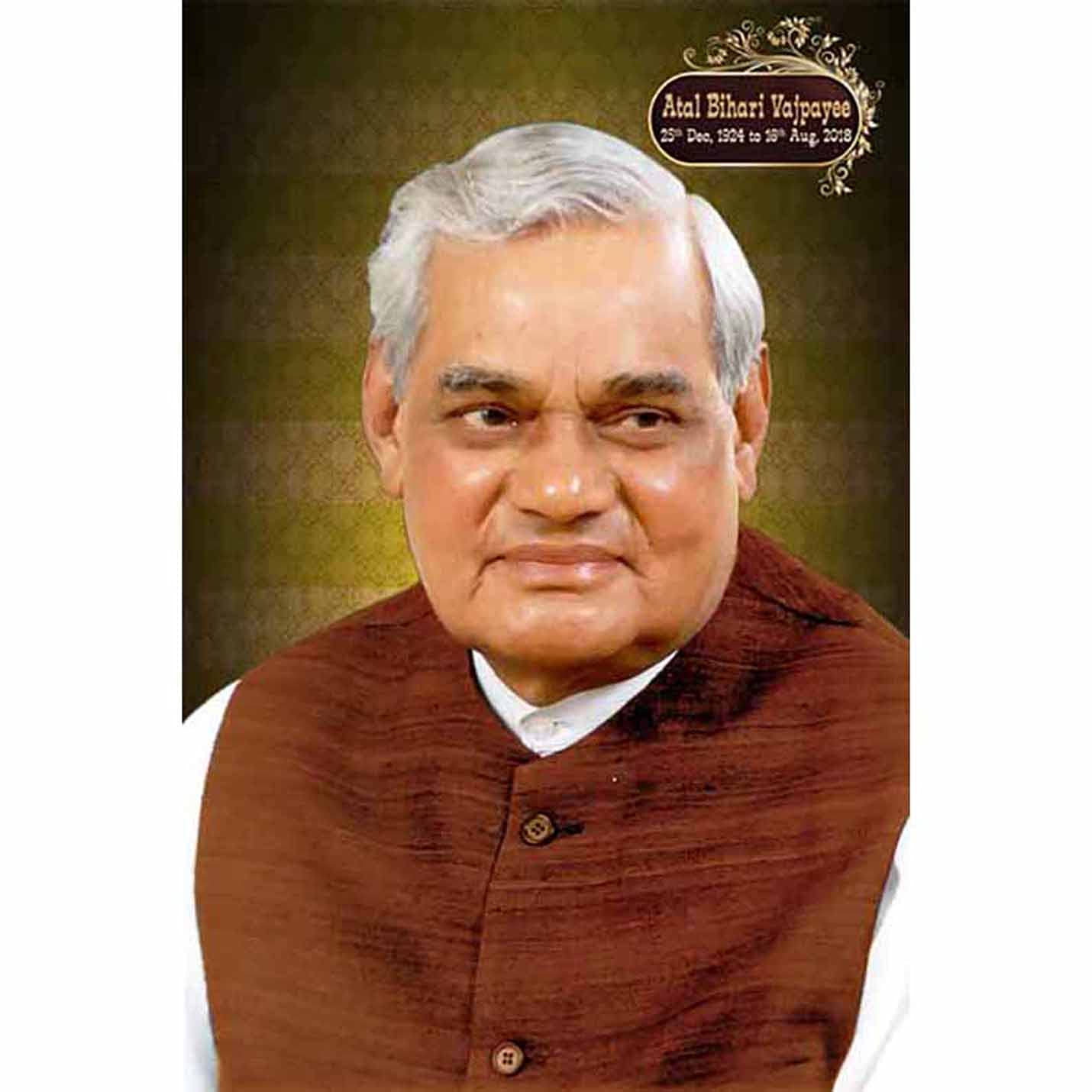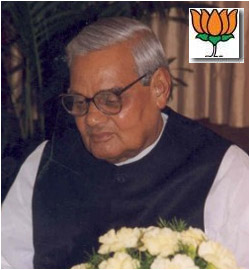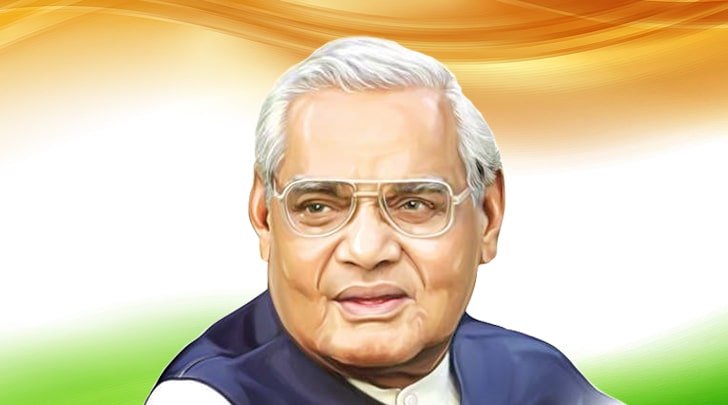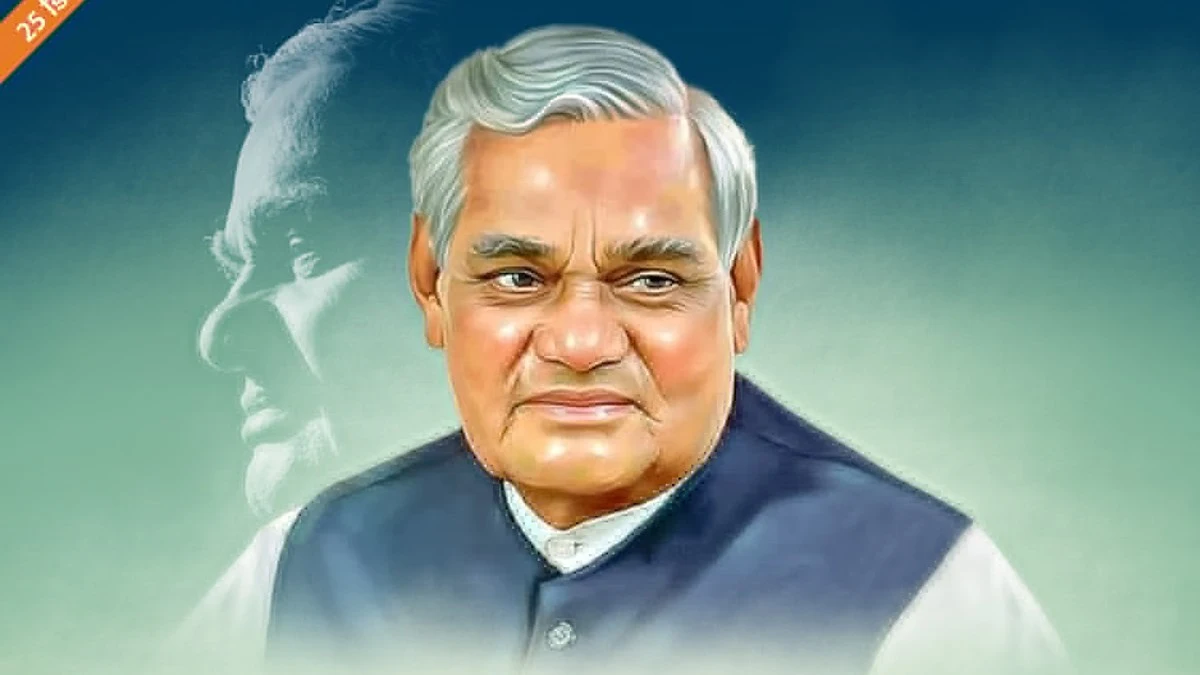Table of Contents

Atal Bihari Vajpayee Biography
Atal Bihari Vajpayee, a former veteran Indian politician, was the 10th Prime Minister of India. His Prime Ministerial tenure includes three non-consecutive terms – the first for 15 days (from 16 May 1996 to 1 June 1996), the second for a period of 13 months (from 19 March 1998 to 26 April 1999) and the third for five years (from 13 October 1999 till 22 May 2004).

| Born | December 25, 1924 |
| Died | August 16, 2018 (aged 93) |
| Place of Birth | Gwalior |
| Religion | Hindu |
| Political party | Bharatiya Janata Party |
| Education | Graduate, M.A. (Political Science) |
| Marital Status | Unmarried |
| Profession | Writer, Politician, Poet |
| Important positions held | 10th Prime Minister of India (19 March 1998 – 22 May 2004) Prime Minister of India (16 May 1996 – 1 June 1996) Minister of External Affairs (26 March 1977 – 28 July 1979) |
| Awards | Bharat Ratna (2015)Padma Vibhushan (1992) |
Atal Bihari Vajpayee was born on December 25, 1924, into a Hindu Brahmin family in Gwalior, Madhya Pradesh.
He won elections to the Lok Sabha, the Lower House of Parliament, nine times during the course of his political career, as well as the Rajya Sabha, the Upper House of Parliament, twice. In several elections, he ran from four distinct states: Madhya Pradesh, Uttar Pradesh, Delhi, and Gujarat. He belonged to the Bharatiya Jana Sangh party, which was founded on October 21, 1951, by Shri Syama Prasad Mookerjee. In the Balrampur Lok Sabha (parliamentary) seat of Uttar Pradesh, Vajpayee won his maiden election in 1957.
Vajpayee served as the President of the party from 1969 to 1972. Vajpayee also served as the Minister of External Affairs in 1977 when the Janata Party won the Lok Sabha elections and Morarji Desai became the Prime Minister of India. Atal Bihari Vajpayee was conferred upon India’s highest civilian honour Bharat Ratna on 27 March 2015.
For his ‘active participation’ in the country’s struggle for freedom, Atal Bihar Vajpayee was felicitated with Bangladesh’s Liberation War Honour by the Government of Bangladesh on 7 June 2015. Prime Minister of India Narendra Modi received the award on his political mentor’s (Atal Bihari Vajpayee) behalf from the Bangladesh President Abdul Hamid, when the former was on an official tour to the neighbouring country. He breathed his last on 16 August 2018, after a prolonged illness.
Atal Bihari Education
He completed his education at Gwalior before being accepted in 1934 to Barnagar Middle School in the Ujjain District.
He earned his undergraduate degree (B.A.) in Gwalior once more before earning his postgraduate degree (M.A.) in political science from Kanpur.
In 1039, he became a volunteer for RSS. In 1944, he was named general secretary of the Arya Samaj movement’s youth branch.
After that in 1947, he became full time worker-pracharak in RSS. He gave up studding law due to partition riots and then went to Uttar Pradesh as a vistarak (a probationary pracharak).
After that, he worked for “Rashtradharma“, the newspaper of Deendayal Upadhyaya: (a Hindi monthly), dailies Swadesh, Panchjanya (a Hindi weekly), and the Veer Arjun.

Atal Bihari Political Journey
He became active member of RSS at the age of 16 in 1942. He and his younger brother Prem arrested for 24 days during Quit India Movement.
In 1951, Vajpayee was seconded by RSS with Deendayal Upadhyaya to work for Bhartiya Janta Sangh-a Hindu right wing political party associated with RSS.
He appointed as the national secretary of the party based in Delhi. Very soon, he became a follower and aide of party leader Shyama Prasad Mukherjee.
He elected from Balrampur. In the Lok sabha Vajpayee impressed Prime Minister Jawaharlal Nehru, and he predicted that Vajpayee would become Prime Minister of India someday.
After the death of Deendayal Upadhyaya the leadership of Jana sangh passed to Vajpayee. He became the national president of Jana sangh in 1968, and ran the party along with Nanaji Deshmukh, Balraj Madhok and L.K Advani.
He arrested in 1975 during internal emergency imposed by Prime Minister Indira Gandhi. Vajpayee served as a foreign minister in Morarji Desai’s cabinet. He became first person who deliver his speech in Hindi in United Nations General Assembly.
Atal Bihari Vajpayee – as Prime Minister
In 1998 general election BJP won and Vajpayee sworn in as the prime minister.
Vajpayee government lasted 13 month until mid-1999 All India Anna Dravida Munnetra Kazhagam (AIADMK) under Jayalalithaa withdrew its support.
The government lost vote of confidence in Lok Sabha by a single vote on 17th April 1999. After that, the Lok Sabha again dissolved and fresh elections were held.
The 1999 general election held after Kargil operation. BJP-led NDA won 303 seats out of 543 seats in Lok Sabha.
That was comfortable and stable majority. Again, that time Vajpayee took oath as the prime minister of India third time on 13th October 1999.
In 2003, news reports suggested sharing of leadership between Prime Minister Vajpayee and Deputy Prime Minister L.K.Advani.
When Atal Bihari Vajpayee threatened retirement, party president Naidu backtracked, announcing that the party would contest the elections under the twin leadership of Vajpayee and Advani.
Positions held by Atal Bihari Vajpayee
- In 1957, he was elected as a member of the 2nd Lok Sabha.
- From 1957 to 1977, he was the Leader of the Bharatiya Jana Sangh in the Parliament.
- In 1962, he became a member of the Rajya Sabha.
- From 1966 to 1967, he was the Chairman of the Committee on Government Assurances.
- In 1967, he was elected as a member of the 4th Lok Sabha for the second term.
- From 1967 to 1970, he remained the Chairman of the Committee on Public Accounts.
- From 1968 to 1973, he served as the President of the Bharatiya Jana Sangh.
- In 1971, he was elected as a member of the 5th Lok Sabha for the third term.
- In 1977, he was elected as a member of the 6th Lok Sabha for the fourth term.
- From 1977 to 1979, he was the Union Cabinet Minister of External Affairs.
- From 1977 to 1980, he was one of the founders and members of the Janata Party.
- In 1980, he was elected as a member of the 7th Lok Sabha for the fifth term.
- From 1980 to 1986, he was the President of the Bharatiya Janata Party.
- From 1980 to 1984, in 1986 and from 1993 to 1996, he was the Leader of the Bharatiya Janata Party in the Parliament.
- In 1986, he became the member of the Rajya Sabha. He was made the member of the General Purposes Committee.
- From 1988 to 1990, he remained the member of the Business Advisory Committee and the House Committee.
- From 1990 to 1991, he was the Chairman of the Committee on Petitions.
- In 1991, he was elected as a member of the 10th Lok Sabha for the sixth term.
- From 1991 to 1993, he was the Chairman of the Committee on Public Accounts.
- From 1993 to 1996, he was the Chairman of the External Affairs Committee. He was also the Leader of Opposition in the Lok Sabha.
- In 1996, he was elected as a member of the 11th Lok Sabha for the seventh term.
- From 16 May 1996 to 31 May 1996, he served his first term as the Prime Minister of India.
- From 1996 to 1997, he was the Leader of Opposition in the Lok Sabha.
- From 1997 to 1998, he was the Chairman of the External Affairs Committee.
- In 1998, he was elected as a member of the 12th Lok Sabha for the eighth term.
- From 1998 to 1999, he served as the Prime Minister of India for the second time. He was also the External Affairs Minister and in charge of ministries and departments that were not specifically allotted to any minister.
- In 1999, he was elected as a member of the 13th Lok Sabha for the ninth term.
- From 13 October 1999 to 13 May 2004, he served as the Prime Minister of India for the third time. He was also in charge of the ministries and departments that were not specifically allotted to any minister.
Also visit: Biography of Prime Minister of India
Biography of Sandeep Maheshwari in Hindi
Books written by Atal Bihari Vajpayee
- National Integration (1961)
- Dynamics of an Open Society(1977)
- New Dimensions of India’s Foreign Policy (1979)
- Heal the Wounds: Vajpayee’s appeal on Assam tragedy to the Parliament (1983)
- Kucha Lekha, Kucha Bhashana (1996)
- Sekyularavada: Bharatiya Parikalpana (Da. Rajendra Prasada Smaraka Vyakhyanamala) (1996)
- Bindu-Bindu Vicara (1997)
- Rajaniti ki Rapatili Rahem(1997)
- Back to Square One(1998)
- Decisive Days (1999)
- Sakti Se Santi(1999)
- Vicara-Bindu (Hindi Edition, 2000)
- Nayi Chunauti, Naya Avasara (Hindi Edition, 2002)
- India’s Perspectives on ASEAN and the Asia-Pacific Region(2003)

Autobiographies
- India’s Foreign Policy: New Dimensions (1977)
- Assam Problem: Repression no Solution (1981)
- Atal Bihari Vaj Mem Tina Dasaka (1992)
- Pradhan Mantri Atal Bihari Vajpayee Ke Chune Hue Bhashana (2000)
- Values, Vision & Verses of Vajpayee: India’s Man of Destiny (2001)
Books and albums on Poetry
- Meri Ikyavana Kavitaem(1995)
- Meri Ikyavana Kavitaem (Hindi Edition, 1995)
- Sreshtha Kabita(1997)
- Nayi Disha – An Album with Jagjit Singh (1995)
- Kya Khoya Kya Paya: Atal Bihari Vajapeyi, Vyaktitva Aur Kavitaem (Hindi Edition, 1999)
- Samvedna – An Album with Jagjit Singh (1995)
- Twenty-One Poems (2003)
Awards Won by Atal Bihari Vajpayee
- He received the Padma Vibhushan in 1992.
- In 1993, Kanpur University honoured him with D.Litt.
- He was bestowed with the Bharat Ratna Pandit Govind Ballabh Pant Award in 1994.
- He received the Best Parliamentarian Award in 1994.
- He was given the Lokmanya Tilak Award in 1994.
- He was honoured with India’s highest civilian award – the Bharat Ratna – in 2015.
- He was conferred Bangladesh’s Liberation War Honour on 7 June 2015 by the Government of Bangladesh.
FAQs Related to Atal
What is the role of Atal Bihari Vajpayee?
Atal Bihari Vajpayee (Hindustani pronunciation) 25 December 1924 – 16 August 2018) was an Indian politician and statesman who served three terms as the 10th Prime Minister of India, first for a term of 13 days in 1996, then for a period of 13 months from 1998 to 1999.
What is the era of Atal Bihari Vajpayee?
Atal Bihari Vajpayee was an Indian politician who served twice as Prime Minister of India, first from 16 May to 1 June 1996, and then from 19 March 1998 to 22 May 2004. A member of the Bharatiya Janata Party (BJP), Vajpayee was the tenth Prime Minister.
Where and when was Atal Bihari Vajpayee born?
Atal Bihari Vajpayee was born on December 25, 1924, into a Hindu Brahmin family in Gwalior, Madhya Pradesh.
